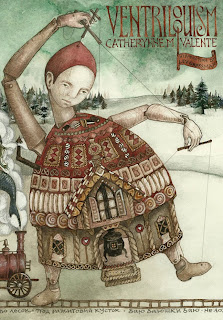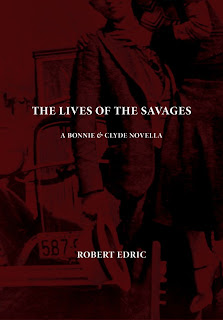Lots more books received for review in the last few weeks. Some I will devour as quickly as possible, others I will nuzzle from time to time, some I will forget about entirely and a year later say, "That was by Stephen King; I didn't realise!" (Expect my review of
One for the Road
quite soon.)
I love this moment, when reviewer and reviewed are for once completely at peace; publishers and authors proud of their books, reviewer looking forward to reading them.
Ventriloquism, Catherynne M. Valente (PS Publishing, 352pp). A new writer for me, but I'm really glad to see PS putting out more books by female writers; not least because it gives us more books by female writers to review in TQF. What a wonderful cover that is – the art is by
Rima Staines.
Order the book here.
Diversifications, James Lovegrove (PS Publishing, 250pp). I've just reviewed and very much enjoyed his
Age of Ra; this looks rather more experimental.
Order it here.
The Lives of the Savages, Robert Edric (PS Publishing, 142pp). A new take on Bonnie and Clyde, but is it fantasy, crime, horror? I'll let you know when I've read it.
Order here.
Christmas With The Dead, Joe R. Lansdale (PS Publishing, 30pp). As a general rule, the shorter a book is the more likely I am to review it! Last year's PS Christmas booklet,
The Night Cache, was very good, although I
still haven't written up my review.
Order here.
Transparent Lovers, Scott Nicholson (PS Publishing, 78pp). "A paranormal noir".
Order here.
Homeschooling, Carol Guess (PS Publishing, 128pp).
Order here.
The Broken Man, Michael Byers (PS Publishing, 64pp).
Order here.
The Sorcerer's House, Gene Wolfe (PS Publishing, 308pp).
Order here.
Stonewielder, Volume 1, Ian Cameron Esslemont (PS Publishing, 264pp) and
Stonewielder, Volume 2, Ian Cameron Esslemont (PS Publishing, 366pp). I thought Steven Erikson's Malazan novellas were quite brilliant, and I'm intrigued by the idea of two writers working in the same world; not in a sharecropping sense, but as true collaborators. Looking forward to this a lot. What a fantastic cover!
Order it here.
Andromeda Spaceways Inflight Magazine #45 (132pp) is an earlier issue of our Australian competitor. In all honesty I probably won't review this – I didn't manage to finish a single multi-author anthology or fiction magazine during the whole of 2010; it's too much of a busman's holiday – but it's good to know Andromeda is still going.
The Life of Polycrates and Other Stories for Antiquated Children, Brendan Connell (Chomu Press, pb, 266pp). The newest book from Brendan Connell and Chomu Press. I've previously reviewed
The Translation of Father Torturo and
Unpleasant Tales by the same author, so reluctantly (because I'm very keen to read it) I've passed this one on to John for review, to give readers a different perspective on this very exciting writer.
 Point
Point, Thomas Blackthorne (Angry Robot). Having signed up for electronic ARCs via the Angry Robot website, we've now got our first batch of books from them. I have to admit that Angry Robot haven't really been the kind of publisher I expected, given their launch statements about connecting with younger readers via new technology and new publishing approaches: their books on the whole seem to be fairly traditional paperbacks. But that aside, they are publishing books by some interesting writers.
King’s Justice, Maurice Broaddus (Angry Robot).
Death’s Disciples, J. Robert King (Angry Robot).
Harbinger of the Storm, Aliette de Bodard (Angry Robot). Jenny Barber interviewed Aliette for
Dark Horizons #57, and I've been looking forward to reading her work ever since. I'm very impressed by the idea of a French writer working in English, having tried the reverse once or twice myself with unimpressive results!
The World House, Guy Adams (Angry Robot). I worked with Guy on the BFS and FantasyCon committees, so I might have to leave this one to John to review. But this is a guy (literally) whose
emails are worth reading for the skill of their writing: I don't doubt his novels will be rather special.
Vegas Knights, Matt Forbeck (Angry Robot).
City of Hope and Despair, Ian Whates (Angry Robot). I've struggled a bit with the collection
A Gift of Joy, but the novels have picked up some good notices, and I'm keen to read this.
Embedded, Dan Abnett (Angry Robot). This looks very much like my cup of tea. And I love tea. My wife recently called me "the Imelda Marcos of tea mugs". My current favourites are a nifty red-striped Marks and Spencers number and a Super Dudes mug from the Disney store.
Morlock Night and
Infernal Devices, K.W. Jeter (Angry Robot). From the writer of
Blade Runner 2,
3 and
4, the first two of which I've owned for years without reading; to be honest even seeing their spines on my shelves makes me feel a bit uncomfortable. But these look interesting.


Camera Obscura, Lavie Tidhar (Angry Robot). I reviewed and enjoyed
A Dick and Jane Primer for Adults, edited by Lavie Tidhar, but haven't read any of his fiction yet. He's a writer very close to the top of my "must read soon" list.
Iris Wildthyme: the Panda Book of Horror, ed. Stuart Douglas and Paul Magrs (Obverse Books, 224pp).
A Revelation of Cormorants, Mark Valentine (Nightjar Press, 16pp)
The Beautiful Room, R.B. Russell (Nightjar Press, 12pp).
Old Order, Jonathan Janz (Untreed Reads, ebook, 30pp).
The Middle Prince, Ivor Randle (self-published, ebook).
Dead Man's Eye, Shaun Jeffrey (Deschca Press, ebook, 2727ll).


















